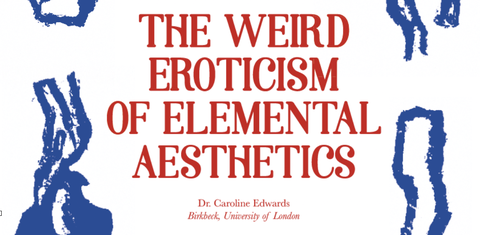06.11.2023
Dr. Caroline Edwards (Birkbeck University, London) | The Weird Eroticism of Elemental Aesthetics | Hybrid Guest Lecture on Monday, Nov 13
The Weird Eroticism of Elemental Aesthetics
Dr. Caroline Edwards (Birkbeck University, London)
-- A hybrid Guest Lecture in collaboration with the Chair of American Studies at the University of Konstanz
Date and Time: Monday, November 13, 18:30-20:00
Venue: TU Dresden, W48, Room 004
For Zoom Link, please contact moritz.ingwersen@tu-dresden.de.
Abstract:
This lecture will consider the weird eroticism that arises from human-elemental encounters in contemporary literature and artworks. In response to the climate emergency, artists, filmmakers, and writers are increasingly exploring the perspectives of nonhuman actors and agents such as fungi, plant life, trees, rocks, and water. In my ongoing research into elemental aesthetics, I’ve been struck by the frequency with which sexuality and eroticism is invoked to convey the simultaneous disgust and fascination with nonhuman agency.
I will draw on a few exemplary examples of this weird eroticism, including queer xyloid sexuality in the arboreal collage artworks of Kenyan American artist Wangechi Mutu, lithic eroticism in the Icelandic ecohorror TV series Katla(Netflix, 2021), human-fungal procreation in British writer Aliya Whiteley’s dystopian novella The Beauty (2014), libidinal entanglements with mushrooms in Silvia Moreno-Garcia’s Gothic horror novel Mexican Gothic (2020), and the weird species boundary-crossing of Mother Trees in British composer Joe Acheson’s Sonic Woodland acoustic installations at the Kew Gardens botanical estate at Wakehurst, West Sussex in England.
How are we to read such artworks? Why might these artists, directors, and writers be invoking our disgust? These works, I argue, embrace the fecund, the abject, and the decomposing possibilities of mushrooms, woods, and organic matter in a rich, ambivalent imagery of inhumanism. Human protagonists are threatened with death and transmutation into forms of nutrient-rich afterlife that nourish plants (human composting) via the elemental aesthetics of symbolic redemption, and unambiguously utopian possibility. I conclude that a cultural analysis that is attuned to the utopian impulse of such artworks can help us navigate the tyranny of human exceptionalism we must overcome at a time of ecocatastrophe and mass extinction.
Dr Caroline Edwards is Senior Lecturer in Contemporary Literature and Culture at Birkbeck, University of London where she is Director of the Centre for Contemporary Literature. Her research focuses on utopian possibility as it intersects with questions of aesthetic form, genre, temporality, political subjectivity, and post/inhuman agency and she works and teaches widely on science fiction. Caroline is author of Utopia and the Contemporary British Novel (Cambridge University Press, 2019), co-editor of China Miéville: Critical Essays (Gylphi, 2015) and Maggie Gee: Critical Essays (Gylphi, 2015) and editor of The Cambridge Companion to British Utopian Literature and Culture, 1945-2020 (forthcoming). Caroline is currently writing her second monograph, Hopeful Inhumanism: The Elemental Aesthetics of Ecocatastrophe and edits C21: Journal of 21st-Century Writings for the British Association of Contemporary Literary Studies. Her research has featured in a variety of places, including the New Statesman, the Times Higher Education, the Guardian, SFX Magazine, BBC Radio 4, BBC Radio 3, BBC One South East, the Barbican Centre, the Institute of Contemporary Arts, the Academy of Fine Arts in Vienna, Whitechapel Gallery, and in a dedicated exhibition at the Museum of London.

